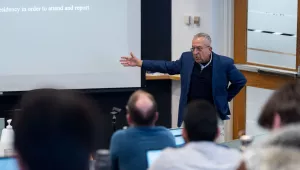Yemen's Humanitarian Crisis: Conflict, Cholera, and International Response
A panel discussion with Safa A. Karman, Yemeni Investigative Journalist, LL.M. Candidate at Harvard Law School, and MPP Candidate at Oxford University; Kristine Beckerle, Yemen Researcher, Human Rights Watch; Claude Bruderlein, Strategic Advisor to the President of the International Committee for the Red Cross and MEI Faculty Affiliate; and Noor Al-Kasadi, Child Protection Specialist, UNICEF Yemen.
Moderated by Steven Caton, Khalid Bin Abdullah Bin Abdulrahman Al Saud Professor of Contemporary Arab Studies, Anthropology Department, Harvard University.
Co-sponsored by the Harvard Humanitarian Initiative Advanced Training Program in Humanitarian Action.




